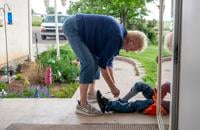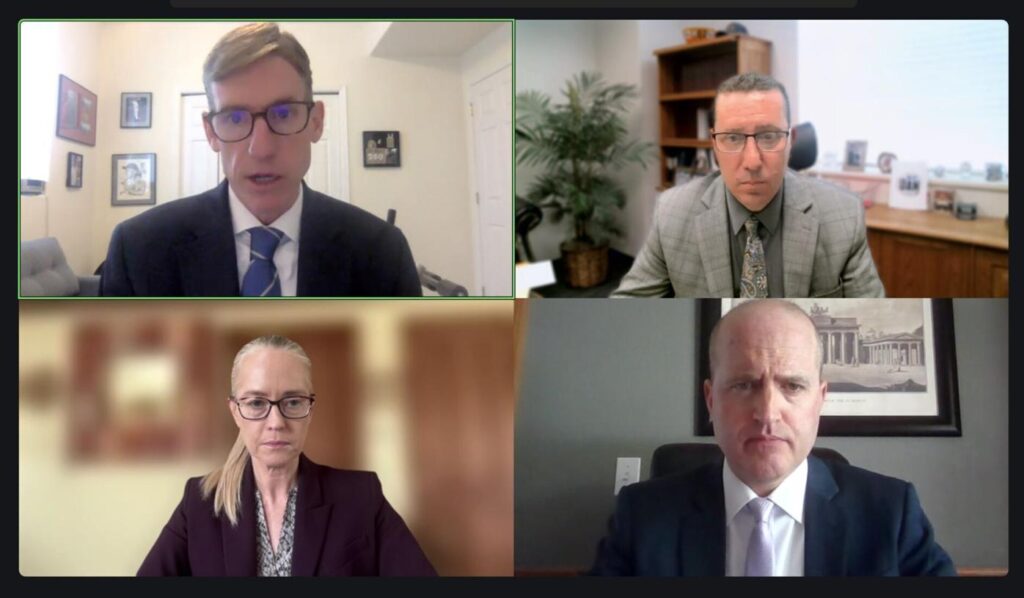From painful past, a Colorado family rose to provide a home of hope for more than 130 foster kids

photos by Parker Seibold, the gazette
PUEBLO COUNTY • Stan Krol could cry about his past and present, but he resists.
In the present, he and his wife, Cora, foster children in need of a temporary home, continuing to provide as they have for 34 years — a span considered “remarkable” by the Colorado Department of Human Services. Over that time the Krols have brought in more than 130 kids, as many as 11 at a time.
They are toddlers and teens caught between harsh circumstances and unspeakable tragedies. Kids of parents trapped in cycles of crime, poverty and addiction.
For 34 years, the kids have almost all been boys. It’s something Cora has noticed about her husband: “He’s more softhearted with the boys,” she says. “Those little ones can just wrap him around their finger.”
Maybe Stan sees himself in them. He’s into his 70s now, but maybe his boyhood doesn’t feel so far behind.
He was born without a country of origin listed on his birth certificate, born to immigrant parents torn by World War II, the son of a God-fearing mother and hard-drinking father who brought his frustrations home from long hours at Pueblo’s steel mill. Stan would be hardened by the same place.
But softhearted is how his own kids would come to see him, the first of three in 1968. The second, Tammy, only remembers those passive-aggressive talking-tos: “I can’t believe you would disappoint us like that …”
Cora shakes her head. “He was supposed to be the disciplinarian,” she says. The role never suited him.
Instead, over their foster care life, it’s been her enforcing timeouts and picking up calls from the school principal and police. Stan, meanwhile, has become even softer.
“You take these kids in because you know they’re hurting inside,” he says, “and you kind of try to get past that and give them the love they need. … It’s hard.”
He’s quiet for a moment.
“You feel really emotional a lot. … It makes you stuffy.”
But now is no time for crying.
A home of need
Six kids as young as 6 and as old as 14 are living with the Krols, and now it’s time to pick them up from school. Off Stan goes in the 15-seat van. He returns home to a typical scene.

One of the Krols’ foster children arrives home from school last mont, ready to drop his bag inside before going to play in the yard with the rest of the kids.
“You know where Nanna’s snacks are,” Cora says to one boy, who rushes to the spread of cookies in the kitchen.
Another rushes to hug her. “What did you do at school today?” she asks, only for the boy to rush away. That’s a no-no for Nanna. “Hey! I asked you a question. What did you do at school today?”

Cora Krol watches as three of her foster kids have a water fight in their front yard in May. Cora and her husband, Stan, have been fostering children for 34 years and have brought in more than 130 children.
Papa is analyzing one’s report card, quietly noting the good and the bad before he must tend to the squirt gun war in the yard. There is laughing and screaming and crying and eventual rule-breaking. Nanna orders one to timeout. She needs a little help from Papa.
Stan is hardly heard over the shouting: “Can you go to your room for a few minutes, please? Thank you.”
Anyone who would call the Krols elderly has not seen them in action.
“The reason we feel so good is because of what we do,” Cora says.
The Colorado Department of Human Services recently recognized them for what they do. In an announcement marking National Foster Care Month, the department’s director called the Krols “examples of ordinary Coloradans doing something extraordinary.”
Their longevity after licensing in 1989 stands out, says Adrienne Baxter, a recruitment and retention specialist with the state.
“Commonly, folks close their home after two years,” Baxter says. “You’re considered an experienced foster parent after like five years.”
The Krols are all too aware of the need.
As of this writing, the state counted 2,174 foster parents and 3,637 youths in out-of-home care — in households or facilities away from their biological parents. In Pueblo County, youths outnumbered certified parents 147 to 70.
Those parents include two more generations of Krols: Tammy and her daughter, Kayleigh Sloan.
Sloan was inspired by growing up around the kids her grandparents took in. She and Tammy help out here and there — not that Stan and Cora need much.

Cora Krol helps one of her foster children tie their shoes last month.
“You have to have a purpose,” Stan says.
“And when you find it,” Sloan says, “why does retirement have to be an option?”
It doesn’t seem to be an option for Stan.
Too many kids need help. Too many need the home he once needed.
Purpose through pain
The home sits on 40 acres of open land and sky unfamiliar to most kids who arrive from the city. A creek runs by. Fruit trees grow not far from where ponies neigh and roosters crow. Dogs and cats roam around.
Now there are fuzzy kittens. A boy from a broken home nuzzles up against one. “I love you, I love you, I love you …”
For all of the boys from broken homes, love is what the Krols aim to teach.

One of the Krols’ foster boys holds a kitten in their garage.
Lessons are written across the walls. Boys pumping iron in the basement gym don’t get tougher without a gentle reminder: “Human. Kind. Be Both.”
Down the stairs, they pass a knitted bird in a frame. That was done by Stan’s mother as a prisoner at a German labor camp during World War II.
The Ukrainian woman was confined there after the Germans invaded her village, separating her from her baby. Her husband had been killed.
Once freed, she’d go on to meet another man at a displaced persons camp in Germany. The Polish man was there after his time as a prisoner.
Stan was born at that displaced persons camp in 1946. The young family awaited refuge and sponsorship that eventually came from a couple in Pueblo.
Stan doesn’t talk much about those days. Tammy has heard the stories.
“They were abusive to my dad,” she says of the sponsors. “You go from one horrible situation and you bring them over here and abuse them.”
It was a struggle as well with his parents. They had a daughter for Stan to look after.
“It was the old days,” he says. “You had to take care of everything, and it was kind of your fault if it didn’t go right.”
It was hard learning English. Hard making friends. Hard bonding with his father between his drinking, hard bonding with his mom, a strict Jehovah’s Witness.
With Cora, it was different.
“I was like a wild child,” she says. “The total opposite of him.”
Cora was the last of eight kids, rounding out a big, rambunctious family raised on a farm. That was the kind of family Stan wanted. A big, lively family very unlike his own, away from all of the unspoken pain.
Their relationship went against family wishes. Cora remembers her family dismissing Stan as “a foreigner.” As for Stan’s parents, “I think the problem for me was I was not European,” Cora says.
In the face of hate, they married in 1957. Cora came to better understand the depths of the man beneath his silence.
“It was a lot on me to make him feel like he was loved,” she says. “I don’t think Stan ever felt wanted, or like he was needed.”

Cora Krol peeks into the bathroom as one of her young foster boys warms up in the tub after a water fight in the front yard on a cool afternoon at the end of May.
If only he could see that he was enough, Cora thought.
“I think Stan has always felt like he needed to prove himself,” she says.
He’d prove himself in Vietnam. He was denied multiple times by multiple military branches. So he’d stay at the mill in Pueblo and apply himself to be a master at everything, welding and electrical and all.
He’d be the father he never knew. He’d work lots of overtime so Cora could be at home with their three kids. He’d work lots more to afford family vacations he never got growing up.
His parents would see that late in their lives. Tammy saw in them pride and regret, saw in them the pain the world wrought.
“I think they were so hardened as people that maybe they didn’t have the opportunity to understand love the way we were loved,” she says.
Filling the space
The Krols have more than tested the bounds of their love.
Kids have brought trouble. They’ve stolen cars and more. They’ve brought home drugs. They’ve picked up knives. Their mental and emotional burdens have been too much to carry.
And then there are the kids who don’t want to fight as much as they want to hug. They’ve come beaten and hungry. Scared and tired. They are bullied but trying their best in school.
“You cannot have a heart and not want to do something,” Cora says.
Stan keeps doing more. Space seems plenty here, but in the back of the house he is eyeing an expansion. More space for family, he says. More space for the kids.
Maybe he’s still trying to prove himself. Maybe he’s still trying to provide everything he never got. Cora continues to wish he knew he was enough.
Now and then, he gets a call letting him know he’s done good.
“Calls that say, ‘I want to thank you for what you taught me, and the principles and stuff like that stayed with me,’” Stan says, quiet as ever, quivering now. “’I was in a lot of pain when I was there, but now I’ve got a good job and a wife and kids, and I want to thank you.’”
And now he can no longer resist. He starts to cry.















